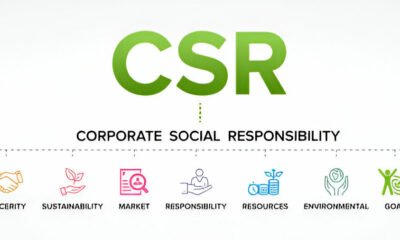

Economy
Sustainability and the worrying consumer-company gap
As sustainability moves centre-stage across the world, a global study indicates a worrying communications gap between consumers and companies.
It underlines the urgency and importance of business leaders in the C-suite to find better ways to develop sustainability strategies that chime with consumer expectations, needs and hopes,
From Marketing to Mattering, a study of 30,000 adults across 20 countries on five continents, finds that 72% believe that business is failing to live up to expectations.
This surprisingly large majority of the adults polled believe that business is failing to take care of the planet and society as a whole.
Interestingly, in economies with a large, emerging middle-class, people are less sceptical and public confidence is significantly greater: two-thirds of respondents in Nigeria and India, for example, believe that business is playing its part.
The report by management consultancy Accenture and Havas Media RE:PURPOSE, a communications and marketing company, follows up the UN Global Compact-Accenture CEO Study on Sustainability published last autumn, in which two-thirds of CEOs admitted their companies were not doing enough to address sustainability challenges.
The study identifies:
– What consumers expect from business and other institutions
– What sustainability means to their choices and attitudes
– How sustainability issues influence their purchasing decisions
– How superior performance on sustainability can better engage consumers, driving value creation and genuine competitive advantage
As the current study points out, consumers have been consistently identified by business leaders as the most important stakeholder in guiding their action on sustainability.
But chief executives are finding challenges in interpreting consumer signals that add to the difficulties in embedding sustainability at the core of business and across varied global markets.
And it is the emerging markets that will define commercial success for most companies over the next 20 years.
The study authors say, “Consumers expect more from companies, from greater honesty and transparency to greater impact on global and local challenges and a more responsible stewardship of natural resources and the environment.
“Yet among business leaders there is a sense that companies have failed to engage the consumer on sustainability; that companies’ reputation and performance on environmental, social and governance (ESG) issues are not informing consumers’ purchasing decisions; and that industry leaders on sustainable business practices are not being rewarded by the market.”
The study underlines that people think business is as accountable as governments for improving their lives. From the optimistic countries in Asia, Africa, and Latin America to the more despondent consumers in Western Europe and North America, there is an expectation that brands and companies should impact positively on lives.
And the degree of people’s optimism correlates directly to their level of expectation of how business can improve their quality of life.
In countries where respondents are optimistic and express high expectations of business, consumers are more likely to consider sustainability in their purchasing decisions and actively seek information on sustainability performance.
The study authors also say, “Consumers worldwide identify critical challenges – job creation, economic growth, pollution, clean energy, ending corruption etc – for businesses to address. Consumers (81% of respondents) expect more from their expenditure than the acquisition of products and services – and this is affecting their perception that companies are failing (42% believe that) to meet their expectations.”
Clearly, people are demanding leadership from brands to meet the most pressing human and environmental challenges, which reinforces our view that all companies cannot wait for consumer demand to drive their actions: people expect business to take the lead.
As Joel Makower, chairman and executive editor of GreenBiz Group, comments, “The survey found that companies’ conventional social responsibility and sustainability reporting activities aren’t sufficient.
“Today’s citizen consumer has higher expectations of business. Dissatisfaction may be regarded as the product of traditional approaches to communicating sustainability, centred on philanthropy and corporate social responsibility, with no clear integration into the products and services people consume, or the connection through their products that brands share with consumers.”
We’ve argued consistently that companies and the brands they rely on would benefit hugely from connected corporate social responsibility (CSR). We also firmly believe that sustainability is not dead; just the opposite. Sustainability strategies which are coherent, consumer-connected and cohesive are absolutely essential to commercial survival.
To highlight just two findings in support of this, ‘young optimists’ aged 18-34 are the most engaged on sustainability. Two-thirds of this group actively buy sustainable brands and almost a quarter say that they “always” consider social and environmental ethics of brands when making purchasing decisions.
And here’s a showstopper for us – young men globally (aged 25-34) are consistently more likely to consider sustainability factors in purchasing decisions, seek information on company sustainability performance, and recommend ethical and responsible brands to their friends. Young women, especially new mothers, are more engaged as consumers on environmental and social issues.
There’s the sustainable commercial future, right there!
How, then, can companies and their leaders address the twinned connectivity and communications challenge? The report makes three main recommendations.
1. Promote a commitment to honesty and transparency
Companies must embed the principles they espouse in marketing and communications throughout their operations: consumers form perceptions based not only on the messages companies promote, but also on the way they define and articulate their purpose, and act upon it in the most transparent way possible.
2. Innovate to improve health, prosperity, and livelihoods
For business, this would need two important shifts in the innovation process: one, align product and service innovations to meet the broader needs; and two, innovate manufacturing and production processes through circular economy models to improve impacts throughout the value chain.
3. Enhance credibility through communicating real, tangible impacts
Companies and brands simply must demonstrate more effectively why they matter to consumers and how they make a meaningful difference to quality of life. Awareness and authenticity are important motivators to purchase.
The study shows to us that all companies need to revisit their CSR policy, focus on sustainability strategies and understand fully how best to connect with and communicate these positive, beneficial elements of their business culture to the people they exist for – their customers, the consumers.
Mark Sait is managing director of energy-saving specialists SaveMoneyCutCarbon.com. He is among the speakers at Blue & Green Tomorrow’s Sustainable September conference, which you can find out more about here.
Photo: Maciek PELC via freeimages
 Further reading:
Further reading:
Lessons in sustainability from the city that touches the clouds
21st century leadership: from business as usual to business as a force for good
Sustainability isn’t about being fluffy; it’s about being strategic


 Environment12 months ago
Environment12 months agoAre Polymer Banknotes: an Eco-Friendly Trend or a Groundswell?

 Features11 months ago
Features11 months agoEco-Friendly Cryptocurrencies: Sustainable Investment Choices

 Features12 months ago
Features12 months agoEco-Friendly Crypto Traders Must Find the Right Exchange

 Energy11 months ago
Energy11 months agoThe Growing Role of Solar Panels in Ireland’s Energy Future






























